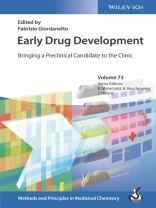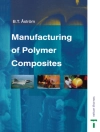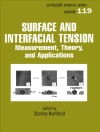This one-stop reference systematically covers key aspects in early drug development that are directly relevant to the discovery phase and are required for first-in-human studies.
Its broad scope brings together critical knowledge from many disciplines, ranging from process technology to pharmacology to intellectual property issues.
After introducing the overall early development workflow, the critical steps of early drug development are described in a sequential and enabling order: the availability of the drug substance and that of the drug product, the prediction of pharmacokinetics and -dynamics, as well as that of drug safety. The final section focuses on intellectual property aspects during early clinical development. The emphasis throughout is on recent case studies to exemplify salient points, resulting in an abundance of practice-oriented information that is usually not available from other sources.
Aimed at medicinal chemists in industry as well as academia, this invaluable reference enables readers to understand and navigate the challenges in developing clinical candidate molecules that can be successfully used in phase one clinical trials.
विषयसूची
Introduction to Early Drug Development
PART I: Drug Substance
Early Phase API Process Development Overview
The Discovery-Development API Transition
API Cost of Goods: Discovery to Early Development
New technologies in Process Development
Case Study: Vortioxetine and Early Drug Development Considerations at the Interface of R&D
Case study: Development of a Practical Synthesis of 4′-Azido-2’beta-Methyl-2′-Desoxycytosine and Its Prodrugs as HCV Chemotherapeutic Agents
PART II: Drug Product
Solubility, Permeability, and their Interplay
Drug Products: Solid-State Properties
Salt and Cocrystal Screening
Particle Size Reduction-From Microsizing to Nanosizing
Drug Product Formulation
A Practical Guide for the Preparation of Drug Nanosuspensions for Preclinical and Early Drug Development Studies
PART III: Pharmacokinetics and Pharmacodynamics
Integration of Pharmacokinetic and Pharmacodynamic Reasoning and Its Importance in Early Drug Development
Prediction of Human Pharmacokinetics and Pharmacodynamics
Translational Modeling and Simulation for Molecularly Targeted Small Molecule Anticancer Agents: Case Studies of Multiple Tyrosine Kinase Inhibitors, Crizotinib and Lorlatinib
Informing Decisions in Discovery and Early Development Research Through Quantitative and Translational Modeling
PART IV: Toxicology
Pre-clinical Toxicology Evaluation
Non-clinical Safety Pharmacology
Predictive Computational Toxicology
Addressing Genotoxicity Risk: A PDE10A Inhibitor Case Study
The Integrated Optimisation of Safety and DMPK Properties Enabling Preclinical Development: A Case History with S1P1 Agonists
From TRAIL to ONC201: Case Study on the Safety Benefit of Developing Targeted Agents Against Cancer-Selective Pathways
PART V: Intellectual Property
Patent Law Relevant to Early Drug Development
Patent Protection Strategy
The Patent Landscape Viewed from Generic and Originator Perspectives
Patent Considerations in Collaborative Drug Development
लेखक के बारे में
Fabrizio Giordanetto graduated in Medicinal Chemistry (Genoa, Italy) followed by his Ph.D. (London, UK) while working for the chemistry unit of Pharmacia – Pfizer (Italy). After positions at Astra Zeneca (Sweden) as Principal Scientist and Project Leader and at Taros (Germany) as Head of Medicinal Chemistry, he has recently joined DE Shaw Research LLC (New York, USA) where he leads medicinal chemistry activities and drug discovery projects. During his career, he worked on several drug discovery programs resulting in multiple clinical candidates spanning oncology, CNS, inflammation, metabolic and cardiovascular indications and >100 international patents, peer-reviewed publications and book chapters.












